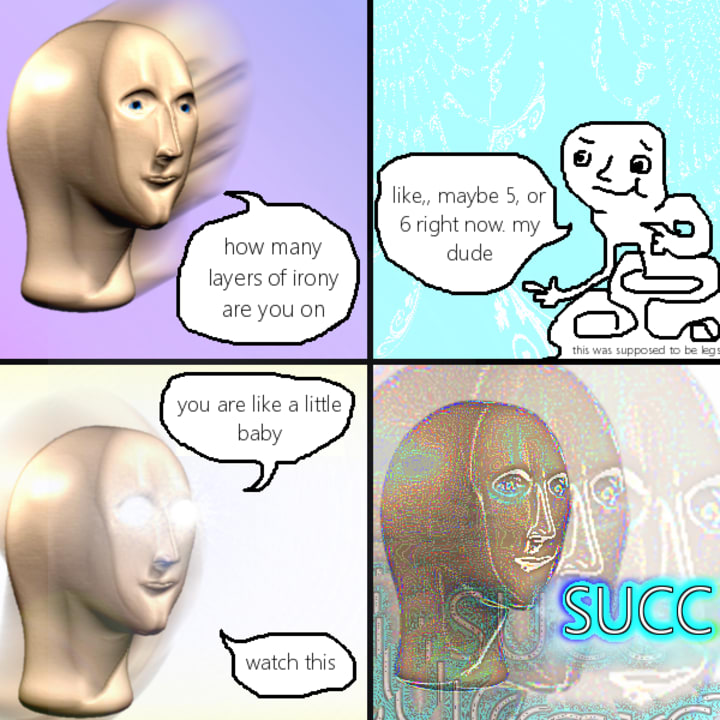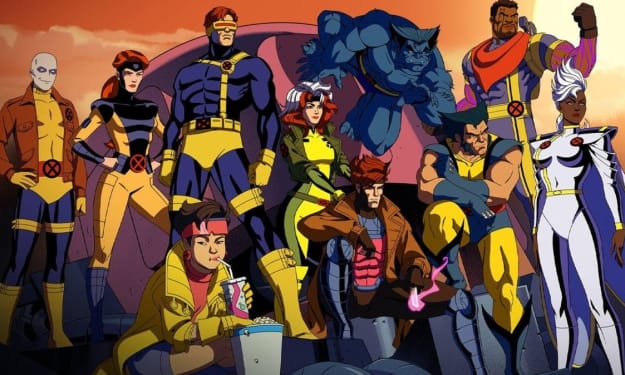
It's Friday night. You and your friends are dining at your local Chili's. As you finish your appetizer and begin waiting for your entrees, a friend nudges you to show you a meme they'd saved earlier. You both share a quick laugh and return to your phones to search for some more.
A moment later, that same friend begins sharing a bit of gossip about their coworker and you sip your tea in response. The table erupts with laughter once more. The elderly couple one table over has no idea what's going on.
***
According to the Merriam-Webster dictionary, memes are defined as both
a.) an idea, behavior, style, or usage that spreads from person to person within a culture b.) an amusing or interesting item (such as a captioned picture or video) or genre of items that is spread widely online especially through social media
By these definitions, we may, therefore, identify captioned images, full-length videos, graphics, popular Vines, and other forms of popular humorous media as memes. Some songs may also possess meme-like connotations (ex. "Never Gonna Give You Up" by Rick Astley, "Careless Whisper" by George Michael, etc.)
Merriam-Webster also identifies the origin of the household word. In 1976, British scientist Richard Dawkins invented the term "mimeme" to distinguish the transmission of bits of humorous culture in his book The Selfish Gene. Seeking a term that would both sound like "gene" and have the Greek root of mim-, translating to "mime" or "mimic," he sprung for a shorter version of the term and realized the term we've come to know and love today.
Let's take a closer look at the history and evolution of the meme.
Humble Beginnings

(Wholesome meme courtesy of Lifewire)
As previously mentioned, memes can take a number of forms. The first evidence we see of popularized memes is dated in the early 90's with video and movie clips. We can identify the origins of millennial meme culture from as early as the mid-late 2000s, in which more videos and top/bottom text memes truly took off. The latter type has certain background images one may superimpose an original caption over. The top/bottom texts of these memes are generally divided by joke versus punchline (or action/consequence) respectively. Other popular memes of this time include "troll face," the "LOLOLOL face," "forever alone," images of cute animals doing silly things and other "relatable" content. The dominant media of this time was the full-length video, as Rick-rolling; keyboard cat, and Gary Brolsma's infamous "Numa Numa" cover seized the meme scene.
The Rise of Sarcasm

(Meme courtesy of Pinterest)
In about 2013, avid "memers" noticed a spike in memes that moreso targeted sarcastic audiences with the Kermit "But that's none of my business" and "Hot dog or tan legs?" memes. Fewer 'innocent' and 'daily life problem' memes were being generated. It is plausible to suggest that the reason for this shift was the maturing humor of the meme audiences who were once more interested in less socially complex memes. It is also valid to suggest that perhaps a new type of meme was needed to boot out the old ones which had, at that point, essentially been monopolized by a few users on platforms such as Reddit and 4chan.
Richard Dawkins suggests that the observed tendencies of natural selection in evolutionary biology also apply to ideas. Ideas are "in competition with each other," always adapting and looking to be more successful or efficient than the last. Some memes die out and some can thrive, living on through developments in format and content. The threshold of success is generally recognized as the popularization of a meme to the point where it can:
- be found on practically any form of social media
- be easily recognized by most people, and sometimes
- be referred to verbally without any context and recognized (ex. "Hi, welcome to Chili's", Kim Kardashian crying, pretty much any SpongeBob meme, etc.)
Memes (similar to any art form, truthfully) are reflective of the desires and circumstances of their audience. As the minds of meme consumers mature, so do their primary forms of entertainment. As they continue to observe social phenomena and pursue further education, the desire for more intellectually stimulating meme content grows. A 44-year-old father of two may not want to look at memes about cats and their ability to acquire a cheeseburger, but may otherwise be interested in looking at memes bashing his rival football team or a complex assemblage of memes discussing multiple topics of interest.
Irony and Further Complexity

(Irony courtesy of Know Your Meme)
Similarly, nihilistic academia and young adults often find themselves enjoying memes with little plot or substance solely for its absurdity, as they believe that humor is subjective and perhaps not everything requires direction or implicit purpose to possess value. In essence, most believe that it's okay to laugh at things that make little sense because you don't really need a reason; it doesn't matter. Most popular memes of this sub-genre tackle topics in existentialism and potent self-awareness of their existence relative to the vastness of space and time itself.
So why do we love memes so much: (TLDR)?
Memes are, at best, a form of escapism for the modern man (read: person). They are something to occupy yourself with in awkward situations, when stuck waiting for a brief amount of time, or perhaps in more intimate moments like trying to fall asleep.
They offer some insight as to who a person may be. Their taste in meme types reflect their sense of humor while the content of the meme itself is indicative of the person's interests (ex. a SpongeGar meme about hockey vs. a doge meme about communism). Many memes serve as a commentary of socio-political events we may feel powerless in. By making light of these situations, we begin to feel empowered.
We share them with others and use them as a way to achieve some form of status (ex. being the "funny" one of the group, having a complex sense of humor).
While memes as we currently know them may fade away, you can take comfort in knowing that their inherent elasticity will allow them to live on far beyond the two of us.
About the Creator
emcue
seeker of knowledge, plunderer of truth






Comments
There are no comments for this story
Be the first to respond and start the conversation.